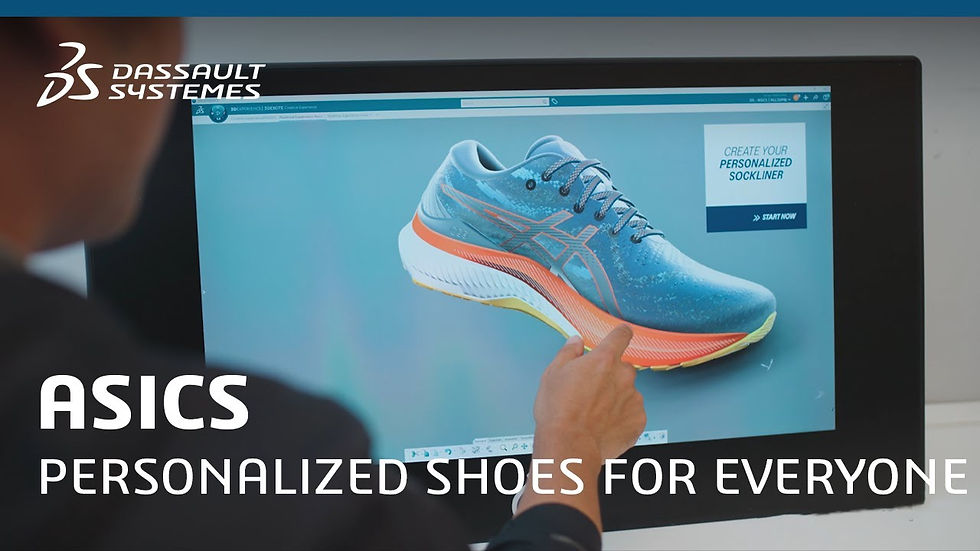VivoBiome: Tailored for You, Committed to the Planet
- Nader Alk
- Mar 31
- 3 min read
What if your next pair of shoes were shaped by your feet, not a factory mold?
Vivobarefoot’s VivoBiome project is doing exactly that. First launched in 2023, it rethinks everything we know about footwear, from sizing systems to sustainability.
Using 3D foot scans and additive manufacturing, the brand creates shoes uniquely tailored to each wearer, offering a precise fit and a lighter environmental footprint.
While other brands have experimented with 3D printing for style or novelty, Vivobarefoot is taking a more thoughtful path, focusing on biomechanics, recyclability, and the long-term health of your feet.
Footwear That Knows You
Most shoes are built around averages. VivoBiome flips that logic by starting with the individual. A quick 3D scan captures the shape, arch, width, and pressure points of a person’s foot. Instead of choosing from a limited set of sizes, customers receive a shoe that conforms to their natural form. The result is a level of comfort and alignment that traditional sizing can rarely achieve.
This approach also supports Vivobarefoot's core philosophy: letting the foot move as nature intended. A personalized fit means fewer constraints, more natural motion, and a lower risk of discomfort or injury.

From App to Arch Support
The process begins with a high-resolution foot scan, which can be completed using a smartphone or an in-store scanner. This data creates a digital model that guides the entire design. Through 3D printing, the shoes are built layer by layer using performance materials that offer flexibility, support, and breathability where it’s needed most.
Because the digital model is so precise, the manufacturing process becomes incredibly efficient. There is no need for cutting, stitching, or mass production tooling. Every pair is made on demand, drastically reducing material waste.

Beyond the Hype
Many brands have tried using 3D printing to make eye-catching designs or limited-edition releases. Few have applied the technology toward long-term solutions. VivoBiome is not about trends or marketing buzz. It is a system built from the ground up to change how shoes are made and worn.
Rather than adding 3D printing as an accessory to traditional methods, the entire product lifecycle is based on digital creation. The design, production, and even recycling process is informed by data. That shift makes it scalable and genuinely impactful, not just another cool-looking sneaker.
Sustainability Is Not Just a Label
One of the most forward-thinking aspects of the project is its commitment to circular design. When a pair of shoes reaches the end of its life, it can be returned and broken down for reuse. This keeps materials in play and reduces the volume of shoes that end up in landfills.
On-demand production also prevents overstock and waste. Since every pair is made specifically for the person who ordered it, there is no inventory sitting in warehouses, waiting to be sold or discarded.

Let Everyone Own Custom Shoes
After completing its first user trial in 2023, Vivobarefoot began large-scale real-world wear testing in 2024, with plans to officially launch the VivoBiome line in 2025. Looking ahead, the brand aims to continuously improve its scanning tools and expand online access, turning personalized shoemaking from a "luxury service" into an everyday option, just as easy as ordering takeout.
This means shoes will no longer be picked from standard sizes, but generated as custom-fit products through data and technology.
We used to settle for shoe sizes, designs, and the discomfort of repeated wear. But VivoBiome offers a future where there’s no need to settle. Technology now allows personalization, comfort, and sustainability to coexist. Vivobarefoot has redefined footwear, not just as something we wear, but as something that supports health, lifestyle, and even reflects a brand’s vision for the future.
And this transformation begins with a pair of shoes made just for you.
Sources: vivobarefoot.com | trendwatching.com
Images: vivobarefoot.com | fastcompany.com | voxelmatters.com




Comments